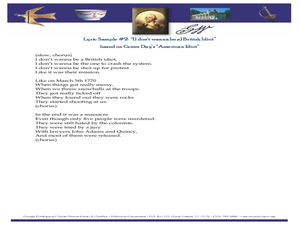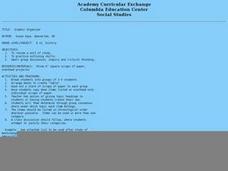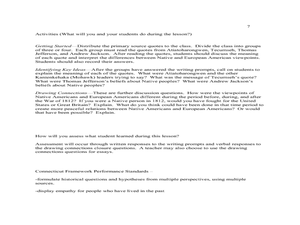K20 LEARN
Analyzing Early American Figures: Analyzing History
Who were they? High school freshmen brush up on their research skills by investigating an important person in American history. They select a name, fill out a KWHL chart, and research why their person is important. Scholars then complete...
Curated OER
American Colonists Protest Song
Students explore the role of protest songs. For this early American history lesson, students research the acts passed by the British that angered colonists. Students then listen to protest songs from contemporary American history prior...
Curated OER
Manners and Mores of Washington's America
Young scholars explore the social policies of early America. In this etiquette lesson plan, students read George Washington's "110 Rules of Civility and Decent Behavior in Company and Conversation." Young scholars identify expectations...
Curated OER
The Living Museum: George Washington, the Slave Owner
Eighth graders bring early America to life. In this George Washington lesson, 8th graders listen to a lecture about the first president, explore the relationships he had with his slaves, and research the backgrounds of some of his...
Anti-Defamation League
Impact of the U.S. Expansion on Indigenous People and Stereotypes About Native American People
The 2004 U.S. bicentennial sparks a discussion about its meaning and importance to United States history. Readings, maps, tables, and reflective writing prompt small groups to explore the westward expansion, Lewis and Clark, and how...
Curated OER
Rights in Early America
Get your historians to hop into someone else's 18th century shoes with a simulation on rights in early America. Each individual gets an identity card, indicating their race, gender, and status (slave or free). Areas around the room are...
Curated OER
The Beginnings of Constitutional Government
Students examine excerpts of Thomas Paine's Common Sense. In this early American history lesson, students read Paine's pamphlet and analyze the information according the rubric provided.
Roy Rosenzweig Center for History and New Media
American Indians and their Environment
People could take a page in ingenuity and survival from the Powhatans. Deer skins became clothes, and the members of the Native American group farmed the rich Virginia soil and hunted in its forests for food. Using images of artifacts...
Curated OER
Graphic Organizing: Early American History
In collaborative groups, young US historians sort cards (each labeled with a single early American event or issue) according to which of the first four presidents was leading the country at the time. Learners copy the events onto a...
National Woman's History Museum
Utilizing Historic Sites for National History Day Research
The National History Day Research program is designed to permit young historians to interview the staff at any historic site. As part of Women's History Month, class members select a site that focuses on the contributions of women. Using...
Curated OER
Putting It All Together: Early American History 1776-1812
Young scholars view the reverse side of state quarters of those states that entered the union before 1812 and make predictions about what the symbols mean to each state. They complete a worksheet during a lecture describing the symbols...
Curated OER
Native Americans of the Chesapeake Bay: Using Primary vs. Secondary Sources
Discover the rich Native American culture that existed at the time of early European exploration into the Chesapeake region through analysis of several primary and secondary sources.
Curated OER
Modern Interpretations
To conclude an eight-lesson study of the events that occurred in the early colonial period in Deerfield, Massachussetss, class members evaluate the point of view and bias found in late 19th and early 20th century retellings.
Benjamin Franklin Tercentenary
Franklin’s Fair Hand American Journalism
Scholars know him for his role in the American Revolution, but Ben Franklin was also a journalist and printer. Learners investigate his standards for what was fit to print using primary sources—including writings where Franklin explains...
Curated OER
The Emerging American Identity
Young scholars define what it meant to be an American early on in the nation's history. In this American identity lesson, students examine the noted quotations and determine what was meant by each of the authors with regards to an...
Curated OER
Agriculture Shapes Kentucky History
Young scholars explore the lives of early American Indians and settlers in Kentucky. They describe the agricultural practices of Indians native to Kentucky and develop a supply list for a group of settlers coming to the state to...
Benjamin Franklin Tercentenary
Many Bens: Character Revealed in Writing
Benjamin Franklin may be known as a Founding Father, but he was also a prolific writer. Scholars examine his better-known pieces to learn about genre, voice, and early American history. The resource includes options for various...
Curated OER
The Figure of Paul Revere. Romanticizing Colonial American History
Students compare paintings to make conclusions about American History in the Revolutionary War time period. Students share opinions concerning visual art. Other artwork can be used to entice inquiry as needed.
Carolina K-12
Early American Settlements
What brought settlers from Europe to North America? By exploring primary sources, such as posters seeking recruits for the new lands, class members take a deeper look at these motivations. To finish, they present their findings to...
Curated OER
U.S History I Review for History Il
Learners review all the information they gathered in their first United States History class. They identify the major contributors to early American history and how they have affected America today. In groups, they create a newspaper on...
National Endowment for the Humanities
Lesson 3: Britain, Napoleon, and the American Embargo, 1803–1808
While the French were once the allies of Americans, the Napoleonic Wars saw the United States almost drawn into a war with its one-time friend. Wars in Europe threatened to draw in the early republic. A primary source-based activity...
Curated OER
The AME Church in U.S. History
Ninth graders explore the history of the African Methodist Church in the United States. In this African American history lesson, 9th graders discover why the church was founded and research its history and noteworthy members. Students...
Curated OER
Interpreting Quotes From Native Americans and European Americans
Students examine the relations between Native Americans and European Americans in the late 1700's and early 1800's. In this Native American history lesson, students read and analyze quotes from Atiatoharongwen, Tecumseh, Thomas...
Curated OER
Bill Robinson: Mr. Bojangles
Mr. Bojangles was born just after slavery was abolished and became one of the most beloved entertainers of his time. Explore key vocabulary, the life of an African-American entertainer, and the impact of the Harlem Renaissance on...

























